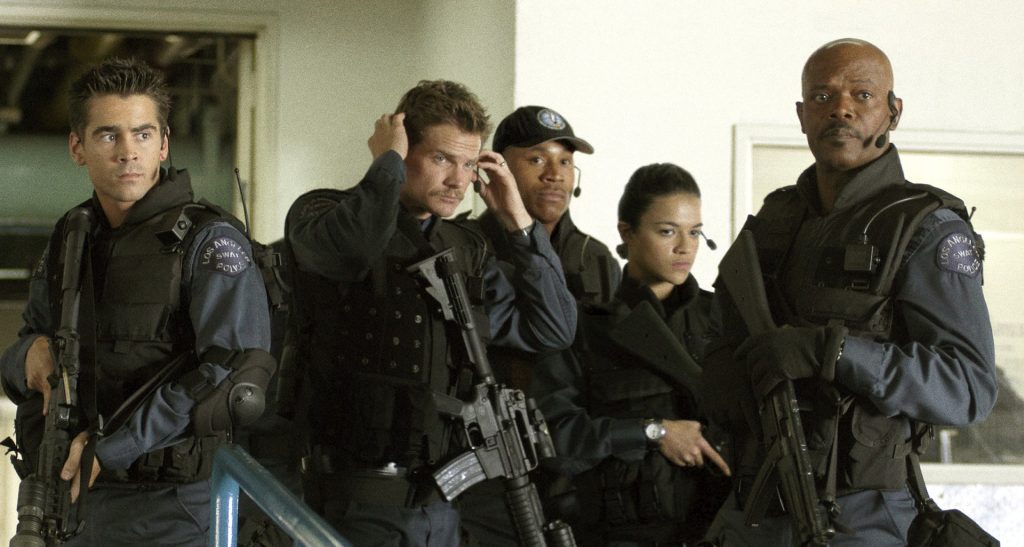“I found screenwriting accidentally,” confessed writer David McKenna, known for his work on American History X, Blow, and S.W.A.T. ” He was initially a business major in college, but later switched to creative writing. “When you’re twenty years old, you go to the movies, but don’t really know what a screenplay is.”
An unfortunate event occurred when McKenna was studying at San Diego State University. “A guy I knew was accused of rape right around the time the movie The Accused starring Jodie Foster was released in 1988.” This compelled him to write a play from the point of view of a man who was accused of rape. “I wrote a hundred and twenty-page “screenplay” in single space play format,” he laughed. He sensed the screenplay may be far too long and visited the bookstore at San Diego State and bought his first book on screenplay format to confirm his suspicions. “I fell in love with it and decided that this was what I wanted to do for a living.”

David McKenna
During his writing career, David McKenna has written around thirty film and television scripts. He was paid on more than twenty of those scripts, which is a two-thirds success rate. Not too shabby. He’s had eight movies made and one television show (E-Ring) produced. Overall, he’s had a third of his projects been paid, one-third produced (and paid on), and a third that he’s shopping around town. That’s a pretty high batting average by industry standards.
“I work smarter, not harder these days,” meaning McKenna writes projects that mean something to him, but with potential buyers in mind. “You have to or else you’re just spinning your wheels.” McKenna mainly writes films in the $10-20 million range so he targets appropriate financiers.
Budget and packaging are the key factors that determine whether a film is produced these days.
The screenwriter has worked in the studio system for years and has noted the landscape has changed dramatically not just for writers. Studios are still mainly reliant on existing IP rather than developing new concepts. “Hopefully, with the success of Top Gun, things will revert more towards to the old studio system a little bit. I hope it’s a wake up call for them.”
The studio system has been anaemic unless you’re making Marvel films.
To IP Or Not To IP
David McKenna confirmed that the frothy price tags studios paid for screenplays are long gone. The process has also changed.
“Back then, there was real excitement when a new screenplay hit the market. Agents would send out a physical script bound by brads via courier. They’d read it over the weekend and writers would hope for a bidding war. There was a real buzz. An urgency.” Now, he describes the process as “lethargic.” It takes months to get a screenplay read and you may or not even receive a response. Selling and buying scripts is like flipping burgers. “There’s so much material out there and so few buyers with real money.”
Although, IP accounts for around ninety percent of the market, there is still some room for original material. McKenna has just sold an original football screenplay called The Twelfth Man to independent producers Jon Berg and Greg Silverman of Stampede Ventures. He’s also shopping another original script and one based on existing IP.
“I don’t understand the obsession with IP because I don’t think the audience cares,” he commented. “They just want to see a good story with great characters. When was the last time you were truly blown away and cried at a movie rather than coming out of the theater like a zombie because you’ve been thrashed around by big action over the past two hours?”
I want the audience to get back to thinking and feeling movies
That said, IP still reigns supreme and greatly enhances the chances of selling your screenplay. If you’re writing original screenplays, he advises screenwriters to keep the budget under $10 million.
Naked scripts without attachments are a very hard sell. Early questions that financiers will ask about new screenplays hitting the market are who the producer is and their track record. “They want to know that project is real and is (more) likely to get made.” Once that bar has been cleared, it’s easier to approach directors and cast to a project.
Studios and streamers are generally buying packages in the current business climate. Occasionally, they may want to attach their own talent to which they have contractual obligations or existing relationships.
When trying to set up their screenplays, writers are advised to approach producers who have produced similar films to there’s in the past. The assumption is that they will continue to make films in the same vein. Occasionally, they may want to try something new, but that involves building a new set of relationships outside their established wheelhouse.
It’s also difficult to approach big name producers without representation. Contests, workshops, and other introductions or referrals are alternative ways to gain representation and access to producers. “It’s a step ladder you need to keep climbing. If you step out of line, you’re seen as a novice.” Still, screenwriters may start a bidding war or jump several steps on the career ladder.

Main cast of S.W.A.T
David McKenna has long standing relationship with Berg and Silverman from their days at Warner Bros. Despite their backgrounds giving him easier access to the industry at large, getting them to buy his script was still a laborious process. “I initially gave them my script called ‘The Downing Of flight TWA-800,’ but they didn’t want to pull the trigger on it. They subsequently read several more screenplays until they finally decided to move on ‘The Twelfth Man,’ my football script.” They could then focus on generating a budget and writing updated drafts. David McKenna is also slated to direct. All this deal-making activity was signed within a month which is considered fast in today’s lethargic climate.
The hustling process wasn’t a waste of time. It gave McKenna time to connect with the creative ethos of Stampede Ventures and to ensure that his screenplays would find the right home. He noted that he didn’t have to pitch too much because they knew him as a person and as a writer. However, lesser known writers need to practise their pitches and loglines so that producers become familiar and comfortable with their work before eventually requesting a script.
Step deals are still a feature of the studio system, although fewer steps are generally offered. Step deals are rare in the streaming world. Steps basically ensure the writer is guaranteed a set fee (hopefully at WGA minima at the least) against another fee if the film gets made. There may be additional guaranteed fees for rewrites and bonuses for box office achievements. “Writers are still entitled to 5% of the net box office according to WGA contracts. However, less than 0.8% of writers receive a check from this stream.” That’s why screenwriters should request profit participation on the box office gross rather than the net figures which tend to run suspiciously low.
David McKenna advises that screenwriters hire competent lawyers especially for their early sales. Entertainment attorneys know what standard rates are and what writers can negotiate. They also know the techniques some industry folk use to avoid payment. Get every agreement in writing. “If you have a bad feeling about someone, ask them to put the money into an escrow account to protect yourself.”
McKenna is launching a new screenwriting podcast called American Screenwriter to add to the crowded field. “Most screenwriting podcasts are boring,” he said. “I want to entertain and have fun. I’ve been doing this for decades. Many people producing podcasts haven’t really had anything produced. Mine are shorter at around twenty minutes or so and I discuss my experiences and career tactics I’ve used.”
He wants each podcast to feel like he’s having coffee with his listeners and give them industry access through a Q&A component. “I want to get a group of up and coming screenwriters to get us back to the old days. I want them to write from their hearts… low budget stuff at first… maybe direct later. They should launch their own careers and control their own destinies rather than wait for permission from the industry.”
Despite Hollywood’s risk aversion and love of IP, David McKenna still advises screenwriters “to write something totally out there to get noticed.” He grew up during the punk rock era and skinheads were more commonplace. Race started to become a factor in the zeitgeist. That’s what inspired him to write American History X. His take on the material was to write a story about intelligent skinheads with a philosophy. “I just went for it. It resonated with producers around town. People were talking about me and it eventually got made.”
His final piece of advice… “Executives can sniff out a novice screenwriter on page one. So spend enough time writing the first few pages.“
